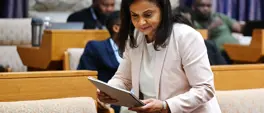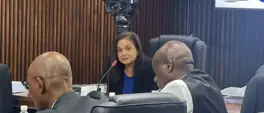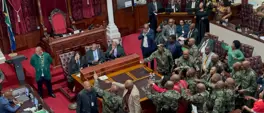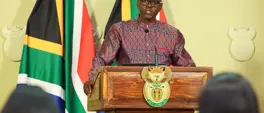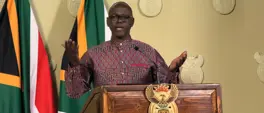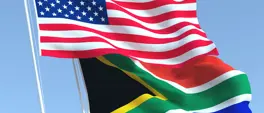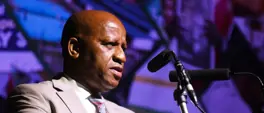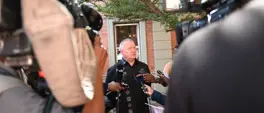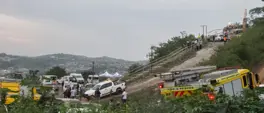Promises, promises: Following up on Cyril Ramaphosa’s 2023 State of the Nation pledges
Africa Check
9 February 2024 | 7:41Of the seven promises made on Eskom, state logistics company Transnet, road infrastructure, digital migration and more, two were kept, two are in progress, and three were broken, according to Africa Check.
Promises, promises: Following up on Cyril Ramaphosa’s 2023 state of the nation pledges
-
Ramaphosa kept his promise to unbundle the National Transmission Company from the power utility Eskom and has also put in place the Comprehensive Student Funding Model to help finance middle-class students who don’t qualify for Nsfas.
-
We rated the president’s promises to fund entrepreneurs through the Small Enterprise Finance Agency and to develop the digital and technology sector through the National Skills Fund as “in progress”.
-
Ramaphosa failed to deliver on infrastructure promises, as plans to develop the ports of Durban and Ngqura are delayed, as is the completion of the Msikaba and Mtentu bridges in Eastern Cape province.
“We gather here at a time of crisis,” said president Cyril Ramaphosa during his 2023 state of the nation address. Highlighting load shedding, unemployment, poverty and crime as some of the most pressing issues facing South Africa, he outlined the government’s plans for the next 12 months.
With that time now up, Ramaphosa is preparing to deliver his 2024 address, with no guarantee of another, as the ruling African National Congress (ANC) finds itself in a precarious position ahead of national elections later this year.
We followed up on some of the promises he made and found some kept and others broken.
Promise: “The National Transmission Company will soon be operational with an independent board.”
Verdict: Kept
South Africa’s state-owned power utility Eskom has come under intense scrutiny in recent years. Declining generating capacity has led to rolling blackouts, known as load shedding.
One proposed solution to these problems is “unbundling” Eskom. This would involve splitting it into three separate companies – generation, transmission and distribution – each with its own board and responsibilities.
To this end, Eskom established the National Transmission Company South Africa SOC Limited, or NTCSA.
Initially hampered by unmet conditions such as not having the relevant consent, the NTCSA received its operating licence in September 2023 and its board was announced in January 2024.
Promise: “Transnet and private sector companies will conclude partnerships at the Durban and Ngqura container terminals to enable new investments in our ports.”
Verdict: Broken
Speaking about the urgent need to improve the efficiency of the country’s ports, Ramaphosa said state-owned logistics company Transnet would finalise private partnerships at two key terminals.
Transnet’s shipping arm, the Transnet National Port Authority (TNPA), manages the country’s nine major import and export ports.
The Durban port, in KwaZulu-Natal province, reportedly handles 60% of the country’s imports and exports but has been ranked near the bottom of ports around the world in terms of efficiency. Other South African ports also rank poorly, according to a 2023 report by the World Bank.
The partnerships involve upgrading the ports of Durban and Ngqura, in the Eastern Cape province, through special purpose vehicles (SPVs) between Transnet port terminals (TPT), the organisation’s shipping arm, and partner companies.
An SPV is an entity a company can set up to transfer financial risk to investors. This creates new revenue streams for the company and investment opportunities for the partners.
This is meant to finance the expansion of the two ports. According to Transnet, the SPV would generate revenue from clients using the terminals, and existing customer agreements would be transferred to the SPV. But, Transnet said, this would not mean selling off any assets. The terminals would revert to the company after 25 years.
In July 2023, Transnet completed the process of selecting a partner for its Durban terminal. In its announcement, the company said it would provide updates on the progress of the Ngqura terminal “in due course”. As of February 2024, no partner had been announced.
“There were no bids received for Ngqura Container Terminal (NCT), as bidders could not guarantee volume growth. Transnet is reviewing options on how to get the NCT to full utilisation,” the company told Africa Check.
Promise: “The construction of Msikaba Bridge and Mtentu Bridge will be finished and make travel in the Eastern Cape much better.”
Verdict: Broken
Staying with infrastructure, Ramaphosa promised the completion of two bridges in South Africa’s Eastern Cape province.
The Msikaba and Mtentu bridges are part of the N2 Wild Coast Road Project by the South African National Roads Agency, or Sanral. The N2 connects four provinces – the Western Cape, the Eastern Cape, KwaZulu-Natal and Mpumalanga. According to Sanral, the new Wild Coast road will open up the strip between the coastal towns of Port St Johns and Port Edward, and provide a “safer, flatter and faster link” between Durban and the industrial centres of East London and Gqeberha.
The Msikaba Bridge is a cable-stayed structure spanning a valley over the Msikaba River. Supported by 127-metre-high pylons, the surface of the bridge will rise 94 metres above the valley floor once completed. Sanral’s website says construction of the bridge “is expected to be completed by the end of 2023”. But according to Laurence Savage, project director for the Concor-MECSA Construction Joint Venture contracted to the project, the commitment for completion of the bridge is around April 2025 and “we are well on track”.
“All four of the anchor blocks, which are 21,000 tons of concrete each, are complete. All of the auxiliary tributary structures are complete and the pylons are at about 85 metres at the moment, of 127. We’re installing the cable inserts at the moment,” Savage said.
The construction of the Mtentu Bridge is more complicated. The joint venture that initially won the contract walked away from the project in 2019 after violent protests by the community.
In November 2022, a new contract for Mtentu was awarded to the joint venture of China Communications Construction Company and MECSA Construction. Construction of the bridge began in August 2023, making completion by the end of that year impossible.
We have contacted MECSA Construction for comment and will update this report with their response.
Promise: “During the course of this year [2023], we will migrate the remaining households to digital television signal and complete the switch off of analogue transmission.”
Verdict: Broken
Historically, the broadcasting of sound and video over the airwaves was done using analogue signals. In the 1990s, it became possible to transmit using binary digits. The process of switching from analogue to digital broadcasting is called digital migration.
In 2006, the International Telecommunication Union, the United Nations agency responsible for matters related to information and communication technologies, set June 2015 as the deadline for countries to switch from analogue to digital.
As a result of missing the deadline, South Africa is no longer protected from disruptions of the radio waves that are used for analogue television broadcasts.
The government has since 2015 missed several deadlines. During his 2021 state of the nation address, Ramaphosa said the digital migration process would be completed by March 2022. He acknowledged the delays in his 2023 address, saying “better late than never”.
In June 2023, the government adopted a two-stage approach to digital migration. The first step involved the switch-off of analogue services above 694 megahertz (or MHz, a unit of frequency) in July 2023. The switch-off of services below this frequency will take place by December 2024.
In March 2022, the Department of Communications and Digital Technologies (DCDT), citing 2018 data from data agency Statistics South Africa, said that there were about 14 million TV-watching households in South Africa.
Of these, 11.5 million households watched TV through satellite transmission and 2.5 million watched on analogue.
Updating this to reflect the most recent data from 2022, we calculated that 10.8 million households watch television through digital transmission. This leaves around 4.3 million households still on analogue.
We have contacted the DCDT for comment and will update this report with their response.
Promise: “Through the Small Enterprise Finance Agency – Sefa – we plan to provide R1.4 billion in financing for over 90,000 entrepreneurs.”
Verdict: In progress
The Small Enterprise Finance Agency, or Sefa, is responsible for promoting the creation, development, and growth of small, medium and micro enterprises (SMMEs). It is an implementing agency of the Department of Small Business Development.
Sefa chief executive Mxolisi Matshamba told Africa Check that the agency had “played a critical role in supporting government initiatives to accelerate access to finance”.
“During the financial year ending 31 March 2023 and as per Sefa’s 2023 audited annual report, Sefa disbursed R2.4 billion to 74,762 entrepreneurs.”
These figures have been verified by independent external auditors, Matshamba said. Figures for the next financial year, which runs from 1 April 2023 to 31 March 2024, are yet to be audited and have therefore not been published. We will update this report when they are, and until then we rate this promise “in progress”.
Promise: “This year, the National Skills Fund will provide R800 million to develop skills in the digital and technology sector through an innovative model that links payment for training to employment outcomes.”
Verdict: In progress
The National Skills Fund (NSF) falls under South Africa’s higher education department. It provides funding for skills development initiatives identified as national priorities in the National Skills Development Plan 2030.
The fund has recently come under fire for its inability to account for billions of rands in the 2019/20 financial year. An investigation into its finances found evidence of fraud, forgery and non-delivery of services by service providers, even though they had been paid. Some of the fund’s most senior officials have been charged with misconduct.
In April 2023, almost three months after making this commitment in his state of the nation address, Ramaphosa said in his weekly newsletter that “ the National Skills Fund will soon launch a new model for demand-led skills development, which will provide R800 million to fund training for unemployed young people in digital skills”.
In November 2023, the NSF and the Department of Higher Education and Training (DHET) launched the Jobs Boost Outcomes Fund with research consultancy company Krutham as the implementing partner.
“The fund is looking for companies, predominantly training entities, who can train young people and place them in long-term good quality jobs,” Riyaadh Ebrahim, Krutham’s programme director, told Africa Check.
The fund is in its pilot phase. “Parties who wanted to participate in the fund could submit an expression of interest by 15 December [2023] ... by the end of January [2024], the successful first-round applicants will be invited to make a more formal proposal,” Ebrahim said.
Successful entities will be assessed by the fund and paid in four tranches based on certain requirements, including training, placement, and follow-up at three and six months after placement. Ebrahim said that R300 million had been allocated to the fund by the NSF and the DHET.
“If the pilot phase proves to be successful and young people are trained and placed as committed then there could be an extension of funding.”
While Ramaphosa pledged more than twice this sum of money for 2023, the launch of the Jobs Boost Fund is a start. We therefore rate the promise in progress.
Promise: “This year, government plans to finalise the Comprehensive Student Funding Model for higher education, particularly for students who fall outside current Nsfas criteria; reaching those who are known as the ‘missing middle’.”
Verdict: Kept
The National Student Financial Aid Scheme, or Nsfas, is a government scheme that provides funding for tertiary education to students from poor and working class backgrounds.
To qualify for funding, a student should have a combined household income of no more than R350,000 per year. This has led to debate about the “missing middle” – students who have a combined household income above this threshold but still cannot afford tertiary education.
In January 2024, higher education minister Blade Nzimande announced a funding model to address this issue. The model aims to support students whose combined household income is between R350,000 and R600,000.
The first phase of the model is set to begin in 2024, with the government pledging R3.8 billion in support. According to Nzimande, this amount will fund 31,884 (47%) of the estimated 68,446 missing middle students.
This report was written by Africa Check., a non-partisan fact-checking organisation. View the original piece on their website.
Claim
Verdict
Source
Trending News
More in Politics
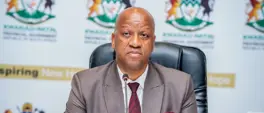
15 December 2025 15:28
Premier Ntuli insists he was never worried about ouster attempt
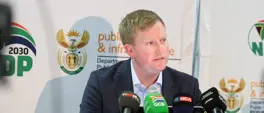
15 December 2025 14:58
DA defends KZN coalition, slams MK for 'intimidation' after failed motion of no confidence
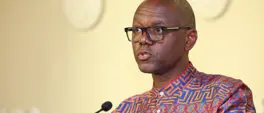
15 December 2025 14:25
Presidency dismisses transparency concerns as Madlanga interim report deadline nears

